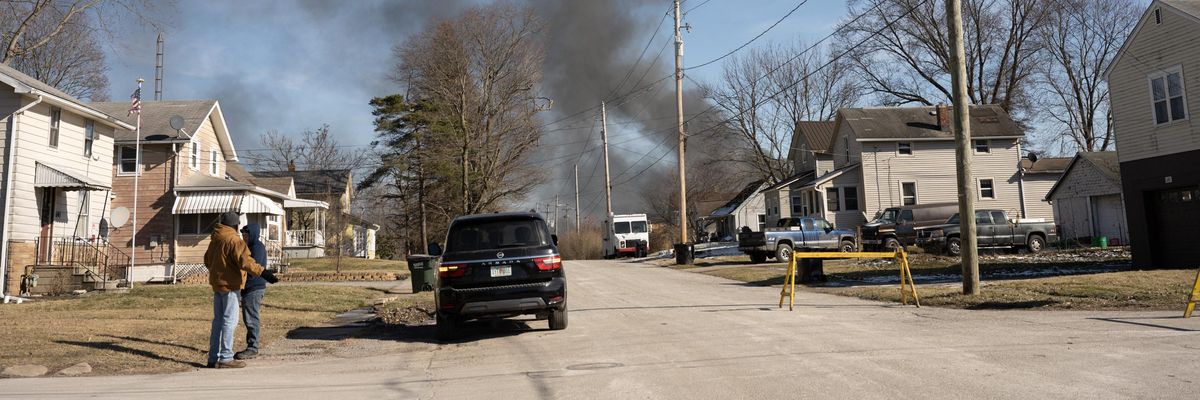Residents of East Palestine, Ohio are voicing alarm and mistrust of officials after a 150-car train carrying hazardous materials—including vinyl chloride—crashed in their small town, prompting emergency evacuations and a "controlled release" of chemicals into the air to prevent a catastrophic explosion.
Norfolk Southern, the company that owns the derailed train, has insisted that public health is not at risk, a sentiment echoed by local authorities. Just five days after the fiery crash, top officials—including Ohio's Republican governor, Mike DeWine—effectively gave the all-clear, telling residents they can safely return home.
Many, lacking viable alternatives due to their limited resources and incomes, have done just that, despite lingering fears of the impacts that the train crash and subsequent unleashing of toxic gases into the atmosphere may have had on their town. Some have reported strong chemical odors and unsettling sights, such as a stream blackened by substances released from the train and dead fish.
"I don't want to take my kids back to that," one East Palestine resident told the Pittsburgh Post-Gazette. "None of us have the money to completely start over somewhere. We're not going to have a choice but to take our children back to that place, and it's not fair."
On Sunday, the U.S. Environmental Protection Agency published a document from Norfolk Southern that lists the cars involved in the derailment and the materials they contained at the time of the crash, which rail workers say was an entirely predictable consequence of Wall Street-backed policy decisions and company moves that have sacrificed safety for profit.
Vinyl chloride, which five of the Norfolk Southern train cars were carrying, has garnered particular concern, given its link to cancer. The Associated Press noted that the controlled burn of chemicals following the crash spewed "phosgene and hydrogen chloride into the air."
"Phosgene is a highly toxic, colorless gas with a strong odor that can cause vomiting and breathing trouble and was used as a weapon in World War I," the outlet reported.
"If there were toxic chemicals being released in a wealthy suburban area, there would be outrage."
The EPA has said it is still monitoring local air and water and conducting screenings in individual homes.
Norfolk Southern, which has offered a mere $25,000 donation to help affected residents, claims in an FAQ posted to its website that "vinyl chloride and other substances associated with the derailment exist in the air as a vapor," "evaporate quickly," and "do not absorb into household materials."
"It is not necessary to undertake any special cleaning of household items or air, and any odors present in indoor air will dissipate," added the company, which announced a $10 billion stock buyback program last March.
Despite assurances from Norfolk Southern, The Washington Postreported that "residents returning to homes in a neighboring Pennsylvania town were advised by state officials to open their windows, turn on fans, and wipe down all surfaces with diluted bleach."
One resident told the Post that her family experienced headaches and nausea in the wake of the derailment. She expressed concern that local officials are suppressing information about the health consequences of the crash and release of chemicals, which sent an alarming plume of dark smoke into the air.
"I've watched every news conference and I haven't heard anything that makes me think that this is a data-driven decision," the resident said of claims that it's safe to return to East Palestine. "We don't feel like we have a whole lot of information."
Another person told the Post that he and his wife aren't planning to go back to their home, which is near the train track.
"The amount of... chemicals that were spilled and burned don't simply just go away," he said. “I don't believe there is any way to know the full effect until enough time passes. And that just isn't worth the risk."
Others have questioned officials' focus on the one-mile radius surrounding the train crash, warning that toxic substances could have drifted much further through the air and waterways.
"There was no wall in the sky. There was no wall in the waterways. It's definitely floating in the airways whatever direction it has gone in and our waterways as well," one resident told a local news outlet. "I just have concern for the water in general, horses, and people alike. There had to be quite a concentration in our local smaller waterways that is actually making an impact on the larger waterway of the Ohio River. So obviously I've got a lot of concerns for the people locally not only now but for the future."
In the 10 days after the derailment, observers have lamented the lack of media attention the situation in East Palestine has garnered relative to other recent stories, including the U.S. military's downing of several unidentified objects over the past week.
Nina Turner, a former Ohio state senator, argued that "one of the reasons the media is so silent about the Norfolk Southern disaster in East Palestine, OH is due in part to classism."
"If there were toxic chemicals being released in a wealthy suburban area, there would be outrage," Turner wrote on Twitter. "The silence is inexcusable."

